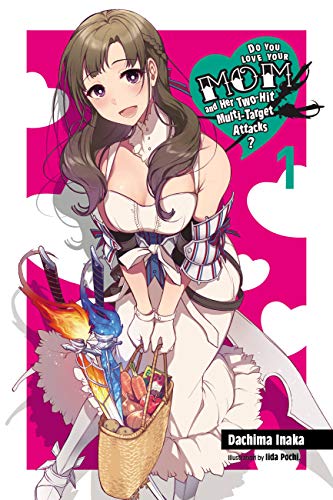By Dachima Inaka and Iida Pochi. Released in Japan as “Tsujo Kogeki ga Zentai Kogeki de Ni-kai Kogeki no Okasan wa Suki desu ka?” by Fujimi Shobo. Released in North America digitally by Yen On. Translated by Andrew Cunningham.
This book is straight up ridiculous. I realize that may be the most obvious thing to say, but I want to say it up front because I went into it thinking that the ridiculous content would take a back seat to sketchy mom-son sex humor. And there is a bit of that, but mostly the comedy is first and foremost the important thing here. This series is not trying to titillate its reader, it’s going for fun. And it pretty much succeeds. We get a lot of amusing riffs on the standard “adventure game” tropes, the characters are all obvious cliches but fairly likeable. Best of all, despite the occasional lewd joke or ogling, there’s absolutely no sense that Mamako (yes, really, that’s her name) and Masato view themselves as anything other than mother and son. This allows the reader to relax and focus on what’s important: Mamako is hilarious.
Masato is our hero, a 15-year-old boy who is dealing with a mom who a) looks about seventeen and is gorgeous; and b) doesn’t seem to realize that he’s not six years old anymore, so is overly doting and smothering. One day he comes home to find a government worker there who tells him that he has been chosen to play in an ‘MMMMMORPG’. He’s not sure why there are so many M’s, but he agrees… and finds himself in a virtual game world. He’s a hero! He gets an awesome sword! He has party members who are an adorable and trusting 12-year-old girl and a tsundere but clearly future love interest mage! There’s just one problem. His mother has come along with him into the game. And she has TWO swords (the two he didn’t pick when given a choice) that do so much damage that he never has a chance to shine. She may not know anything about adventure games, but she certainly knows how to make him feel awkward and embarrassed.
As you can see, we’re not going for subtle here. In fact, the overtness is part of the point – the series works better for it. The game that Masato and company are in is a beta release, and they’re meant to be testing it. This leads to many of the NPCs simply reciting the guidebook, or speaking in actual gamer talk rather than having it filtered through a fantasy world. Wise, the tsundere girl (she spends most of the book in a state of fury, but there are good reasons for it) is amusing, and you get the feeling she’d be nice if she ever calmed down. Porta, the girl, is a parody of the ‘little girl party member’, and this about as deep as a small puddle, but her pureness is almost endearing. As for Masato and Mamako, they start off exaggerated types, and by the end are slightly less so. Believe it or not, there is a bit of plot and character development in this, and by the end of the book Masato has learned not to take his mother’s actions as a personal attack, and Mamako has (possibly) learned to allow her boy to grow up. (I say possibly as, well, there’s more books in the series, and the premise is that Mama is more powerful and steals the spotlight.)
I also need to mention the main reason to read this series, which is Ms. Shirase, the government agent who starts this entire mess. She is amazingly funny in a deadpan sort of way, and I was delighted at her appearances throughout, as well as her constant fourth-wall breaking. I really hope we get more of her. The series reminds me a lot of KonoSuba in terms of its style and laughs, and I think fans will enjoy it. Yes, there’s some incest parody – that’s the premise! – but I feel safe that it won’t go anywhere and isn’t serious. Recommended for fans of comedies and mothers.

